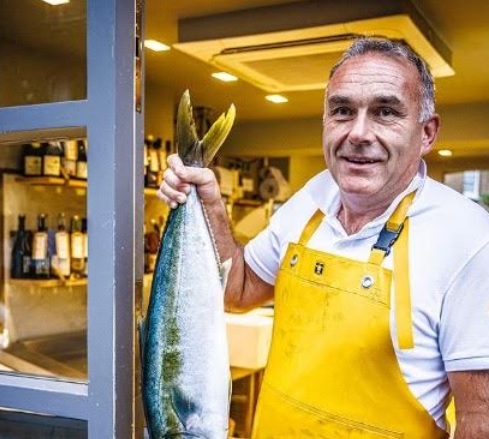Britain’s workaholics: Meet the Hackney fishmonger who is up earlier than the milkman

Britain’s small business owners are among the hardest working people in the country with many up before the milkman and still going long after the DJ has played their final song.
Nearly half of bosses work more than 50 hours per week while a third start work before 5am – a time better known to milkmen, according to a new report.
A third get to bed after 2am and a quarter sometimes work through the night, a report of small businesses by Mercedes-Benz Vans UK found, shared with City A.M. today.
With cost of living leading to rising wholesale costs, small businesses are struggling to find ways to stay profitable without hiking prices. One step many bosses are taking is to work more hours.
100-hour working week
One small business owner whose Christmas is affected by a heavy workload is high-end fishmonger c (pictured above), who now celebrates Christmas on 26 December, due to his 100-hour working weeks in the run up to the festive season.
The married father-of-three said: “There are weeks leading up to Christmas when I manage three hours of sleep a night. I’ve had to stop myself falling asleep at the Christmas dinner table because it was my first day off in a month.”
“We always do our family Christmas on Boxing Day now because it means I can sleep on Christmas Day and wake up refreshed the following day. My family understands and it works best for us.”
O’Sullivan, 52, from East London, took over Fin and Flounder in 2015 when it was a single shop on Broadway Market, Hackney. Seven years on, it now supplies 70 of the capital’s top restaurants, including Michelin-starred Brat, Lyles and The Clove Club.
But securing the best produce and supplying the best restaurants comes at a cost.
“There are big sacrifices you have to make if you’re running a small business, often around giving up your time with your loved ones. But I love what I do and couldn’t imagine ever doing anything else.”
Brendan O’Sullivan.
“In the first few years we used to order fish from the big wholesale markets and then deliver it. But I realised driving to Devon and buying direct from the fishermen meant I could get the best of the catch at better prices and not pay a middle man.”
The return trip to the South West meant a round trip of 500 miles taking nine hours, with Brendan having to juggle this work with dealing with customers, negotiating with suppliers and managing the business.
He added: “At the busy times I get up at the crack of dawn and get on the road so we can have the fish ready to sell on Broadway Market that day.”
“On top of this I make sure all 16 employees are doing their jobs, have the right equipment and are paid on time. All this means I often don’t finish until after midnight and if I’m lucky I grab a few hours of sleep before starting again.”
“Whether I’m buying fish, negotiating with top chefs or buying new equipment for the business, there are never enough hours in the day.”
Holidays
Brendan is far from alone. A lack of time to complete tasks (34 per cent) was the biggest issue for bosses, the research found.
The consequence of longer hours is bosses say they are far more likely to miss important moments like their child’s birthday or Christmas than they were five years ago.
The festive trading period is the busiest for many self-employed, accounting for up to 20 per cent of annual revenue or more*, meaning many are reluctant to shut down completely.
The report found one in five – almost 1m small business bosses in the UK – will be working on Christmas Day, nearly half will work Christmas Eve and 28 per cent will work Boxing Day.